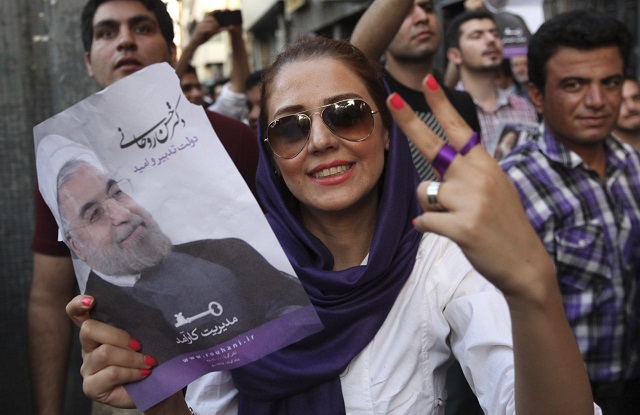The landmark nuclear agreement struck with world powers, known as the Joint Comprehensive Plan of Action, took place during Iranian President Hassan Rouhani’s tenure and garnered world-wide attention, but issues closer to home may determine the incumbent president’s fate in the upcoming presidential election, scheduled for May 19.
“People believe the nuclear deal was fake,” Mohsin Daliri, a carpet shop owner in Tehran, told Al Jazeera in April. “There was hope upon hope that things would get better, but in reality, it stayed the same.” “My business is suffering from stagnation. There is no positive impulse in the market. Banking transactions, the use of credit cards - none of this was fixed, and this is very important for moving the market forward,” Daliri added.
In July 2015, Iran and the multilateral bloc known as the “P5 +1” (the United States, Britain, China, France, and Russia, plus Germany) reached an agreement to remove some sanctions placed on Iran, in exchange for Iran curbing its nuclear program. By January 2016 the agreement went into effect and freed up tens of billions of dollars in oil revenue and frozen assets, also allowing Iran to trade more freely with world markets.
The upcoming election may prove to be a referendum on Rouhani’s ability to manage Iran’s economy – the second largest in the Caspian region after Russia and worth about $1.5 trillion in gross domestic product (purchasing power parity), making it the 19th largest economy worldwide.
Macroeconomic indicators show that the nuclear deal, which removed some financial, insurance and trade sanctions, is having positive effects on the country’s economy, but individual Iranians like Mr. Daliri have not felt them – and rival politicians are capitalizing on the mood.
"This deal was like a check that the government has been unable to cash," said presidential candidate Ebrahim Raisi during the second presidential debate held last Friday.
Raisi, considered Rouhani’s strongest rival, enjoys the support of Iran’s Supreme Leader, Ayatollah Ali Khamenei, who has criticized Rouhani’s policy of rapprochement with the West and has also argued that the nuclear deal had not yielded the benefits he promised.
“The gap between rich and poor has widened in Iran,” Raisi added.
Mohammad Bagher Ghalibaf, the mayor of Tehran and a presidential candidate, berated Rouhani in the debates for failing to make good on an alleged promise “to create four million jobs,” saying unemployment was Iran’s “biggest problem.”
Iran’s real gross domestic product grew by 7.4 percent over the past year, but that was mainly driven by oil exports rather than job-creating investments, according to the International Monetary Fund. Official unemployment runs at just over 12 percent but independent analysts put it at around 20 percent.
Juxtaposed next to concerns from citizens like Mr. Daliri, and complaints of widespread economic stagnation by Rouhani’s rivals, are indications that the nuclear accord is, in fact, having some positive impact.
In 2016, Iran’s trade with the European Union increased by over 345 percent compared to 2015. According to the latest figures released by Eurostat, the European Union’s statistics agency, Iran's exports to the EU stood at roughly € 5.5 billion (USD $ 5.98 billion) in 2016, compared to € 1.24 billion ($ 1.35 billion) in 2015, and € 1.16 ($ 1.26 billion) a year earlier. Exports from Europe to Iran also increased, totaling € 8.25 billion ($ 8.98 billion) in 2016 compared to € 6.45 ($ 7 billion) in 2015 and € 6.42 ($ 6.99 billion) in 2014.
In addition, data compiled by the Middle East Bank shows that the volume of crude oil and natural gas production, which accounts for one-quarter of Iran’s economy, increased by at least 65 percent from March to December of last year, thanks to the lifting of sanctions.
While these growth rates point in a positive direction, it might be a while before such developments lead to visible improvements in Iranian’s standards of living and change their political perceptions, as real incomes of many segments of the economy still remain weak. The housing and construction sectors, for example, which are major sources of employment opportunities, remain in recession.
Despite economic concerns, analysts say Rouhani still stands a good chance at winning reelection, thanks to the support he continues to enjoy from his base that swept him to victory four years ago and who fear that a return to a hardline presidency could usher in more repression at home and isolation abroad.
“I am tired of slogans, tired of political feuding. But I will vote for Rouhani. In the election I have to choose between bad and worse,” Homeyra Pazokian, a university student, recently told Reuters.
The third and final debate of the Iranian presidential campaign, which will focus on economic issues, is scheduled for May 12.







 President Aliyev emphasized the critical role of the North-South Transport Corridor in fostering transport cooperation between Azerbaijan and Russi...
President Aliyev emphasized the critical role of the North-South Transport Corridor in fostering transport cooperation between Azerbaijan and Russi...
 Armenian sappers commenced on Monday mine-clearance operations in the territories adjacent to the Saint Mary Church in village of Voskepar (Armenia...
Armenian sappers commenced on Monday mine-clearance operations in the territories adjacent to the Saint Mary Church in village of Voskepar (Armenia...
 The Mine Action Agency of Azerbaijan (ANAMA) reported on Thursday the discovery of a significant amount of explosives in the Khojavand district of ...
The Mine Action Agency of Azerbaijan (ANAMA) reported on Thursday the discovery of a significant amount of explosives in the Khojavand district of ...
 Russian Foreign Minister Sergei Lavrov has reasserted that Moscow has no intentions to stop the fighting in Ukraine, even if peace talks commence.
Russian Foreign Minister Sergei Lavrov has reasserted that Moscow has no intentions to stop the fighting in Ukraine, even if peace talks commence.



